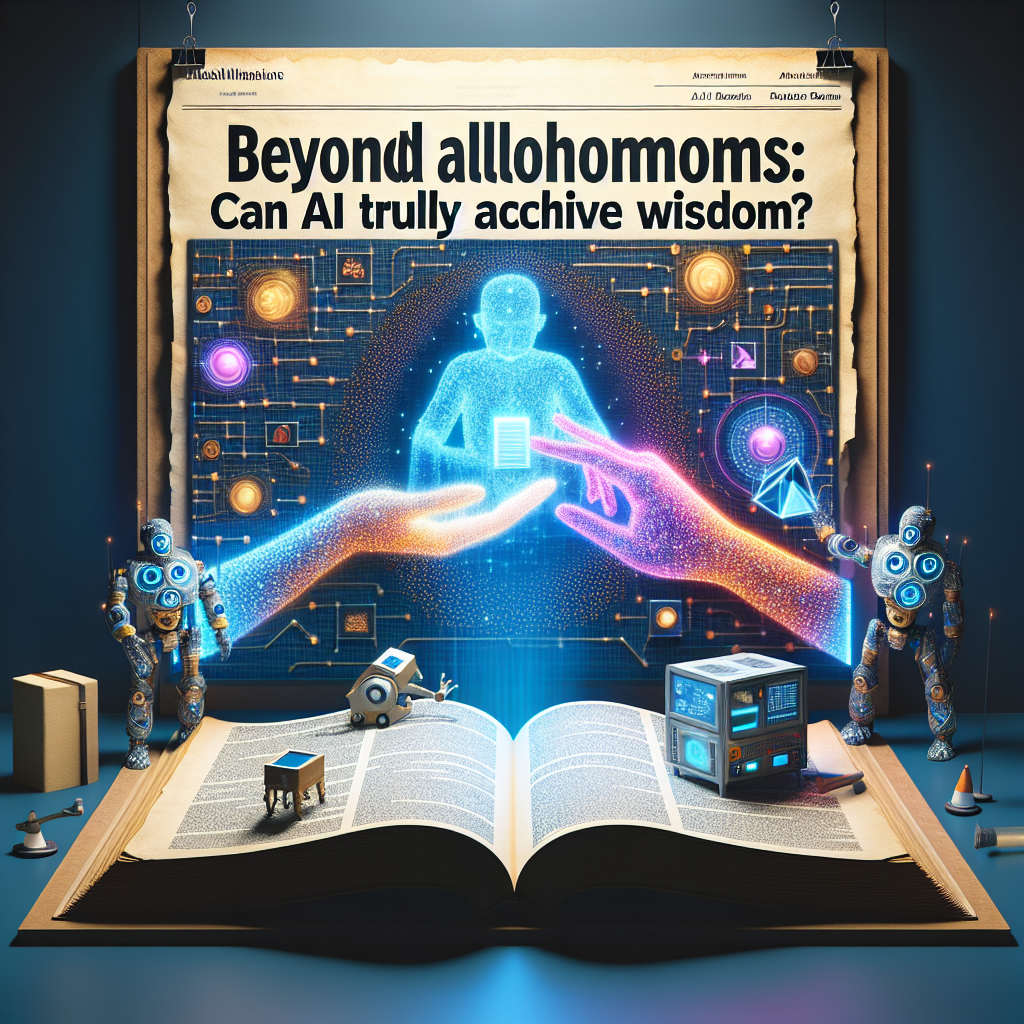The world today buzzes with talk of artificial intelligence. AI systems are everywhere. They drive our cars, recommend our movies, and even assist in medical diagnoses. These intelligent machines perform complex tasks with incredible speed and accuracy.
But as AI grows more sophisticated, a profound question emerges. Can these powerful algorithms ever truly possess wisdom? Or are they forever confined to mere intelligence?
This distinction is more than just semantics. It is fundamental to how we build and interact with AI. Understanding this difference helps us set realistic expectations. It also guides us in developing AI responsibly.
Decoding AI’s Brilliance: Intelligence Defined
When we speak of AI’s intelligence, we refer to its ability to process information. It learns patterns, solves problems, and makes decisions. All this is based on vast datasets. AI excels at tasks that require logical reasoning and prediction.
The Power of Computation
AI systems are masters of computation. They can analyze millions of data points in seconds. This allows them to identify correlations human brains might miss. From predicting market trends to optimizing logistics, AI demonstrates remarkable cognitive power.
Think about a chess-playing AI. It can analyze countless moves. It calculates probabilities and identifies optimal strategies. This is a clear display of intelligence. It learns from experience, adapting its approach over time. This learning, however, is purely statistical. It is based on outcomes and data.
Learning from Data
Machine learning algorithms are at the heart of modern AI. These algorithms are trained on enormous quantities of data. They identify underlying structures and relationships. This enables them to make accurate predictions or classifications.
For instance, an AI can identify a cancerous tumor on an X-ray. It does this by comparing the image to thousands of previously labeled images. This capability saves lives. Yet, it operates without understanding the concept of illness or human suffering. Its intelligence is functional. It is task-oriented.
The Elusive Concept of Wisdom
Wisdom is a far more complex human attribute. It goes beyond mere knowledge or intelligence. Wisdom involves deep understanding. It encompasses experience, insight, and good judgment. It often includes an ethical dimension.
Beyond Algorithms
Wisdom is not just about knowing facts. It is about knowing how and when to apply them. It considers the context, human values, and potential consequences. A wise person understands the nuances of a situation. They can navigate moral dilemmas. They often have empathy and emotional intelligence.
Consider a doctor. They use their medical knowledge (intelligence) to diagnose a disease. But their wisdom guides them. It helps them choose the best treatment plan for a specific patient. They consider the patient’s fears, family situation, and quality of life. This requires more than just data processing.
The Role of Human Experience
Human wisdom is forged through lived experience. It is shaped by success and failure. It comes from relationships, suffering, joy, and reflection. These experiences build an intuitive understanding of the world. They foster common sense and ethical reasoning.
AI, in contrast, learns from simulated experiences or datasets. It lacks direct, embodied interaction with the world. It does not feel joy or sorrow. It does not grapple with personal loss. These are crucial components of human wisdom development.
Bridging the Gap: Where AI Stands Today
Currently, AI’s wisdom remains rudimentary. It can mimic wise decisions if programmed to do so. It can even generate coherent ethical arguments. But these are based on patterns observed in human-generated text. They are not derived from genuine understanding or feeling.
AI’s Ethical Dilemmas
AI can follow ethical guidelines. These are typically hard-coded rules or learned from ethical texts. However, real-world ethical dilemmas are rarely black and white. They involve conflicting values and unforeseen consequences.
An autonomous vehicle, for example, might face a no-win scenario. Should it prioritize the passengers’ lives or pedestrians’ lives? AI can calculate probabilities. It can follow pre-set rules. But it cannot feel the weight of such a decision. It cannot truly understand the moral anguish involved. This shows a clear lack of true wisdom.
The Challenge of Common Sense
Common sense is a cornerstone of wisdom. It is our intuitive grasp of how the world works. It includes everyday knowledge. Things like knowing that objects fall down, or that people get wet in the rain. AI often struggles with these seemingly simple concepts.
Despite advancements, AI systems often lack robust common-sense reasoning. They can be fooled by slight variations in data. They may make absurd mistakes that no human would. This highlights their brittle understanding of the world. Their intelligence is specialized. It often lacks the broad contextual awareness that underlies wisdom.
The Future Landscape: Collaboration Over Competition
The future of AI is not about machines replacing human wisdom. Instead, it lies in a powerful collaboration. AI can enhance our intelligence. It can help us process vast amounts of data. It can identify patterns we might miss.
Augmenting Human Wisdom
Imagine AI as a powerful assistant. It provides data-driven insights. It highlights potential risks. It offers different perspectives. Humans then apply their wisdom. They use their judgment, empathy, and ethical understanding. This human oversight is crucial. It ensures responsible and beneficial outcomes.
For example, in legal settings, AI can analyze case precedents. It can predict outcomes. But a human judge still makes the final ruling. The judge incorporates human context, compassion, and the spirit of the law. This is where human wisdom truly shines.
Designing for Ethical AI
As AI becomes more integrated into our lives, ethical design is paramount. We must build AI systems that respect human values. They should be transparent, fair, and accountable. This requires human wisdom in the design phase. It involves thoughtful discussions about societal impact.
The development of AI should focus on empowering humanity. It should aim to solve complex global challenges. It should not seek to replicate or replace the unique qualities of human wisdom. Our empathy, creativity, and moral compass remain invaluable. They are essential for a thriving future.
Conclusion
The journey into artificial intelligence is a testament to human ingenuity. AI continues to push the boundaries of what machines can do. It excels in tasks requiring immense computational intelligence. However, the profound depths of human wisdom remain distinct.
Wisdom is born from life’s rich tapestry. It involves experience, emotion, and ethical reasoning. These are dimensions AI cannot yet genuinely replicate. The most promising path forward is one of synergy. We should leverage AI’s intelligence to augment human wisdom. This collaborative approach can lead to a future where technology truly serves humanity’s highest aspirations.
What are your thoughts on AI, intelligence, and wisdom? Do you believe AI will ever truly be wise? Share your insights in the comments below.



